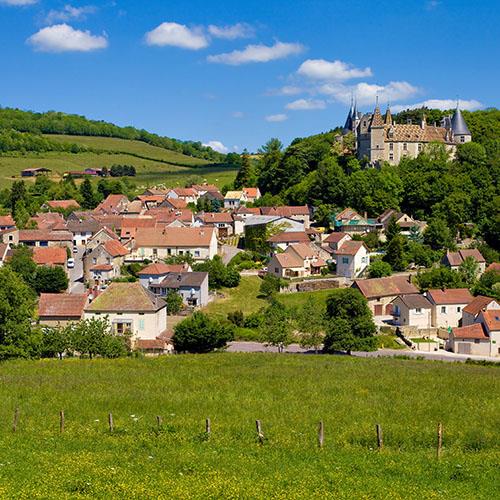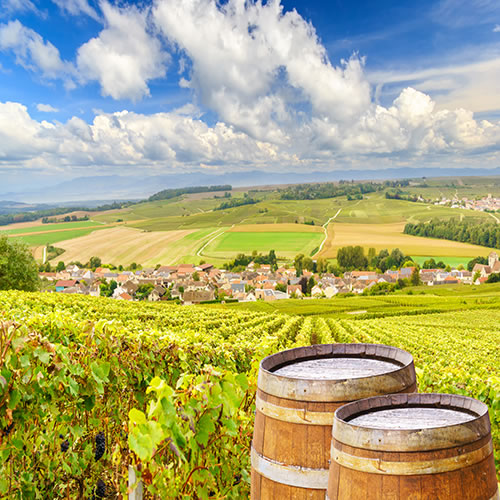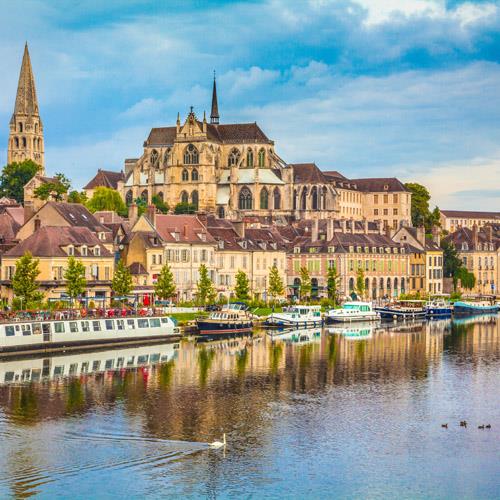


France is famous for its wine regions, with over 3,000 different wines across two million hectares of vineyards, wine lovers from around the world flock to France for its sheer abundance of vineyards and vintages. Each wine region offers a different grape variety, unique environmental conditions, and their own special wines. There are six primary wine-producing regions: Alsace, Bordeaux, Burgundy, Loire, Provence, and the Rhone Valley. These French wine regions are not just famous for their fabulous French wines, but also for their picturesque views, charming villages, delicious foods, lively culture and festivals, with beautiful surrounding vineyards. You can learn more about France's noteworthy wine cities by clicking here.
Though Germany is known for its beer, its wine-producing regions also boast some of the most amazing scenery, finest food, and best-touted tourist attractions, making it the perfect destination for any wine lover. Germany offers 13 official wine regions, the same number as in France. The regions are located mostly in the southern part of Germany and along the Rivers Rhine, Mosel, and Ahr. Soil as well as climate favor the ripening of the grapes, white as well as red, and give German wines their much-coveted flavor and quality.
Italy offers the perfect combination of food, wine and people that can’t be beat, and it’s a must for any lover of wine and culture. The country boasts thousands of vineyards found in many of its regions which produce hundreds of famous varieties of wine, from the bold reds in the hills of Tuscany to crisp sparkling wines in the northern lakes region, and one-of-a-kind varietals at rustic island wineries in Sicily.
Wine is closely related to Greek culture and religion with a much more diverse climate and terrain than most people realize. Out of the 700 wineries in Greece, only a few can produce enough to export, so many excellent wines come from small-producers and go undiscovered outside of Greece. The country is a bit of a mystery to many wine drinkers, who may be limited by their knowledge of the region, grape varieties, or simply the pronunciation. However, one visit to Greece, sipping dry white wine of Santorini Island, sampling rosé on a Peloponnese road trip, indulging in sparkling wines in the mountainous north, or discovering the reds of Crete: there is something for every taste.
Cyprus may not be well known internationally when it comes to wine, but don’t let that fool you. The people of Cyprus have been making wine for nearly 4,000 years and legend has it that they were taught by none other than Dinoysus, the God of wine himself. Given that winemaking goes back for centuries here and rumors that Cypriots were among the first winemakers in the world, it can easily be said that they are pretty good at their craft.
Spain was the third-largest producer of wine in the world in 2017 following Italy and France. The vineyards of Spain cover the largest land area at a sprawling 2.4 million acres! That is 20% larger than the California Wine Estates! Wine has been cultivated in Spain since at least 1,100 BC when it was established by the Phoenicians in the Cadiz area. The country has 138 official wine designations (as of 2020) with each region being incredibly diverse along with an extremely varied climate leading to the production of everything from zesty Albarino to inky, black Monastrell, collectible treasures, delicate whites, and opulent reds.
Driving Time
Nantes - Saumur: 1 hr. 30 mins. approx.
Saumur - Tours: 1 hr. 35 mins.
Tours - Blois: 45 mins. approx.
Blois - Bourges: 1 hr. 30 mins. approx.
Bourges - Paris: 2 hrs. 40 mins. approx.
Driving Time
Paris - Reims: 1 hour 51 mins. approx.
Reims- Nancy: 2 hr 30 min approx.
Nancy- Strasbourg: 2 hr 7 mins. approx.
Strasbourg- Colmar: 1 hrs 2 min approx.
Colmar- Dijon: 2 hrs 42 mins. Approx.
Dijon- Paris: 3 hrs. 17 min approx.
Driving Time
Paris - Dijon: 3 hour 43 mins. approx.
Dijon- Reims: 2 hr 54 min approx.
Reims- Paris: 1 hr 51 mins. approx.
Driving Time
Paris - Dijon: 3 hour 44 mins. approx.
Dijon- Paris: 3 hr 44 min approx.
Driving Time
Paris - Chablis Wine Region Area: 2 hrs./ 2 hrs. 30 mins. approx.
Chablis Wine Region Area -Dijon: 1 hr. 20-35 mins. approx.
Dijon - Lyon: 2 hrs. 5 mins. approx.
Driving Time
Paris- Nice: 9 hour 43 mins. approx.
Nice- Riviera Hilltown: 2 hr 14 min approx.
Riviera Hilltown- Nice: 2 hr 20 mins. approx.
Driving Time
Paris- Loiret Area: 1 hour 33 mins. approx.
Loiret Area- Loir-et-Cher: 1 hr. 30 min approx.
Loir-et-Cher- Indre-et-Loire: 1 hr 2 mins. approx.
Indre-et-Loire- Western Loire: 2 hr. 27 min approx.
Western Loire- Nantes: 38 mins. approx.
France boasts lively cities, idyllic sun-drenched beaches and the glamorous and gorgeous Cote d`Azur coastline. There are so many different possibilities from world-renowned Paris, one of the most famous cities in Europe, to a seaside holiday spent lounging on beaches, swimming in the sea, and dining at stylish waterfront restaurants.
France has so many charming towns, villages, cities and hamlets that are totally unique from one another and worthy of any travel bucket list. These villages offer the best of French culture and heritage and beyond the most popular tourist sites. Many of these villages only have a population of a few hundred, offering visitors a more intimate and authentic experience of France.
With over 2,000 years of history, France boasts more than 40 UNESCO World Heritage Sites, and has the fourth largest number of historical sites in the world after Italy, China, and Spain. The UNESCO-listed sites take a variety of forms including historic towns, palaces, castles, religious buildings, forts, canals, and landscapes. These sites can be found spread all across France, so wherever you go, you won’t be far away from one of them.
French cuisine is renowned for its flavor and finesse. Once you have your first meal here, you’ll quickly realize that food in France is more than just fuel. The French regard gastronomy as essential to the art of living, and the culinary culture of the country runs deep. From wholesome desserts to delectable cheeses, wines, stews, soups, fresh fish….every region in France has its own specialty. In fact, French cuisine is so highly regarded around the world that it was added to UNESCO’s list of intangible cultural heritages in 2010. The land of cheese, croissants, and crêpes is waiting for you.
France is not just Paris, but fortified towns with elaborate chateaus and castles; Roman ruins and religious monasteries; verdant vineyards and sunflower fields; magnificent mountains and the warm Riviera sunshine and so much more. With its winding country lanes, exploring France`s countryside is often best done by car.